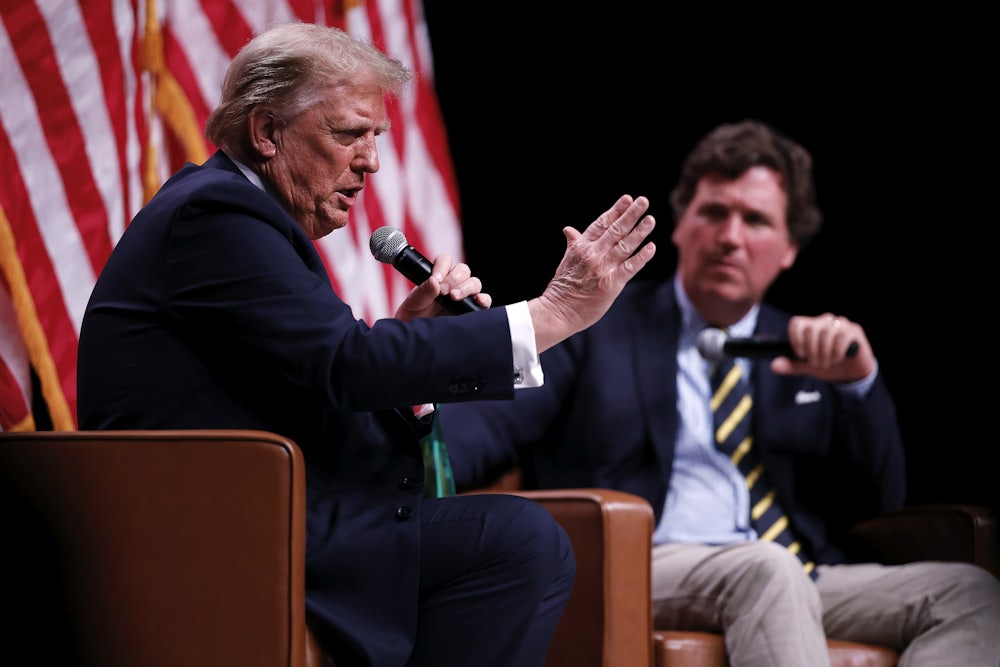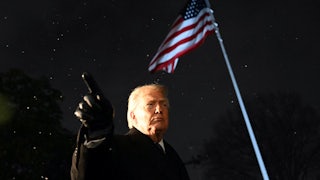You may have heard it said that Donald Trump won in 2024 in part by vowing to end “forever wars.” During the campaign, Trump ripped Democrat Kamala Harris for campaigning with Liz Cheney, slamming her for wanting “war with every Muslim Country known to mankind.” News organizations credulously insisted that this sort of anger over military entanglements in Iraq and Afghanistan fueled Trump’s “movement.” Some even suggested that war fatigue—not his unflagging affection for Vladimir Putin—drove Trump-MAGA opposition to arming Ukraine.
A new battle between Trump and Tucker Carlson over Israel’s war with Iran is severely undermining that understanding of MAGA. Carlson and MAGA podcaster Steve Bannon, among others, have been urging Trump not to deploy the U.S. military in tandem with Israel. Trump appears close to doing so, and people like Carlson and Bannon are loudly proclaiming that this would betray the MAGA movement—which in turn is angering Trump.
“Somebody please explain to kooky Tucker Carlson that IRAN CAN NOT HAVE A NUCLEAR WEAPON!” Trump raged on Truth Social late Monday. Trump also vented about this to reporters, declaring: “I don’t know what Tucker Carlson is saying.”
What’s triggering Trump is Carlson’s surprisingly direct criticism of him over Israel’s hostilities with Iran. Carlson claimed Trump is “complicit” in this war, apparently due to Trump’s expressions of support for Israeli strikes on Iran’s nuclear facilities and top military leadership. Trump is now weighing whether to deploy American B-2 bombers to help destroy Iran’s nuclear enrichment facility at Fordo, which would entangle the United States in exactly the sort of Mideast conflict he vowed to avoid.
All this has deeply split the MAGA coalition. Carlson has denounced top Fox News figures like Sean Hannity for actively encouraging Trump to pursue “direct U.S. military involvement” abroad, slamming them as “warmongers.” In an online discussion, Carlson and Bannon argued that this threatens to drive away supporters who want to “stop the forever wars,” describing them as crucial to the MAGA coalition. And MAGA stalwarts like Matt Gaetz and Marjorie Taylor Greene have sounded rattled as they urge Trump not to sell out MAGA here.
But how deep does this supposed antiwar sentiment really run inside MAGA?
Well, here’s a test: Republican Representative Thomas Massie on Tuesday introduced a House resolution barring Trump from entering into war with Iran without Congress’s explicit authorization. Co-sponsored by Democratic Representative Ro Khanna, this “privileged” measure will get a vote if House Speaker Mike Johnson doesn’t procedurally thwart it.
There’s some debate over whether the legislative vehicle this measure uses is binding on a president (and Trump would veto anything that’s binding). But a vote would force members on record, and a statement of broad opposition to war without authorization would send a strong message that MAGA really does want him to resist foreign entanglements.
“It’s a test of whether the MAGA movement is really antiwar,” Khanna told me.
Theoretically, a coalition of some Republicans and some Democrats should back such a resolution. Many liberals have long wanted Congress to stop ceding its warmaking powers to presidents. Some (including yours truly) opposed Barack Obama’s efforts to appropriate these authorities at the time.
What’s more, many Democrats oppose war with Iran. As Matt Duss argues, Trump helped pave the way to this moment by withdrawing from America’s 2015 nuclear deal with Iran; our intelligence services have not assessed that Iran has decided to produce nuclear weapons; and rushing into war now would be illegal and further destabilize the Mideast.
Leading Democratic officials have endorsed a similar view, and Massie’s resolution has a number of Democratic co-sponsors. Meanwhile, Senator Tim Kaine has introduced a similar resolution in the upper chamber.
Khanna says he believes that all but about 20 Democrats will support the House measure, and he hopes to keep the defections much lower (a Senate Democratic aide expects a few defections on Kaine’s resolution, as well). As Khanna put it to me, this is a test for both parties, and at bottom a test of whether we’re “going to have an antiwar party in America” at all.
So some Republicans will be needed. But how many self-described MAGA Republicans will step up?
There are reasons for skepticism. Zack Beauchamp has persuasively argued that the whole idea of Trump’s “antiwar” appeal rests on deep confusion. While Trump didn’t start major wars, he does favor targeted but extremely aggressive military violence where he perceives it as being in narrow U.S. interests (or perhaps his own). In his first term, Trump relaxed rules on drone killings and other types of protections against civilian casualties, leading both to soar.
Meanwhile, some confuse Trump’s hostility to the postwar liberal international order with an “isolationism” that eschews foreign military entanglements. But as Nicholas Grossman points out, this doesn’t reflect principled opposition to military action. It reflects Trump’s desire to shred the Western alliance and suck up to authoritarians who similarly hate that alliance, while generally undermining multilateralism and any other international frameworks he might perceive as constraining to the U.S.—and to himself.
Some also confuse Trump’s hatred of the “deep state” with dovishness. But Trump despises the deep state because it tried to hold him accountable for his lawbreaking, and because a professionalized civil service is a barrier to unchecked authoritarian rule—not because it’s a locus of warmongering.
You can see that reality playing out in the Trump-Carlson battle: Carlson is loudly telling Trump that the deep state is duping him into war with Iran: Shouldn’t Trump be wary of deep-state enemies trying to bring him down? But Trump is now lashing out at Carlson, not at the deep state. People become enemies of Trump not when they substantively work against some principle he supposedly holds dear but rather when they publicly criticize him, hold him accountable, fail to be sufficiently worshipful of his glory, or become an inconvenience in any way.
The push for a resolution constraining Trump also highlights another impulse of MAGA that counters the “antiwar” canard: its desire for Trump to harbor quasi-unlimited powers and aggressively channel the people’s pure, unified will (i.e., MAGA’s will) in the form of a Caesarist, world-historical figure unconstrained by grubby parliamentary busybodies. It’s hard to see how MAGA will support limits on his warmaking powers or anything else that risks diluting his aura of “strength.”
But guess what? MAGA Republicans can prove all this wrong, by supporting the resolution reasserting congressional control over warmaking authority, geared toward accomplishing what MAGA itself claims to be for: fewer “forever wars” abroad.
It’s unlikely that many congressional Republicans, who’ve ceded so much authority to Trump already, will do anything of the sort. Trump demonstrated exactly what MAGA is really made of when he tweeted this:
AMERICA FIRST means many GREAT things, including the fact that, IRAN CAN NOT HAVE A NUCLEAR WEAPON. MAKE AMERICA GREAT AGAIN!!!
In other words, Trump grasps that “America First,” or MAGA, is simply whatever he says it is at any given time. And here it may mean enthusiastically backing war with Iran. Will MAGA robotically go along? We’ll soon find out.








